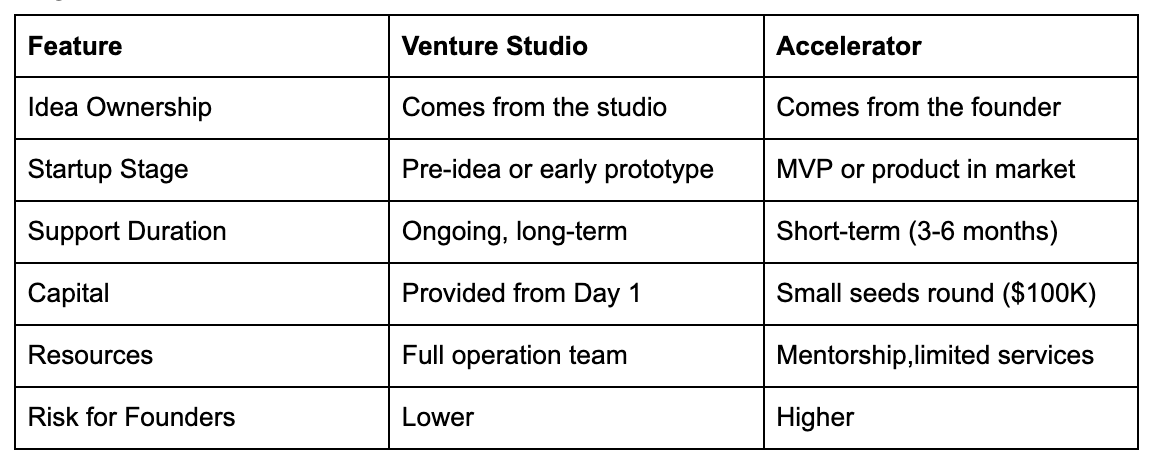Investors used to bet on founders’ ideas. But in 2025, many are shifting strategy: they’re investing in venture studios - organizations that build companies in-house, from problem-identification to founding teams to operational muscle. In a world where uncertainty rules, venture studios offer not just upside, but a clearer path through risk.
Here’s how venture studios are drawing in more investor interest this year, grounded in data and real examples.
Momentum You Can Measure
The interest in venture studios isn’t just hype. According to the Global Startup Studio Network (GSSN), startups born inside studios have about 30% higher success rates than those founded traditionally. From idea to Series A, the timelines are dramatically compressed: studio-born ventures take around 25.2 months to reach Series A, while conventional startups take about 56 months.
Seed funding is far more accessible through studios: approximately 84% of studio-born companies raise a seed round, compared to much lower rates for startups outside that model. And of those, 72% go on to secure Series A funding. By contrast, traditional startup paths hover around 42% for making it to Series A.
Hexa’s Low Failure Rate & Practical Startup Support
Hexa, a Paris-based venture studio, is a live example of why investors are paying attention. Hexa typically launches four to five startups per year. For each project, they invest roughly €800,000 in the early stages - this covers recruiting a co-founder team (CEO + CTO generally), putting together a small team of 10-15 employees, and building the first version of the product.
What’s notable is Hexa’s failure rate: around 6%. That is, only about 6% of its studio projects fail outright. The rest either continue to operate or move toward exit. That is well below the often-cited norm for startup survival (many startups fail at higher rates, often estimated at 10-20% within a few years).
Also, Hexa takes about 30% equity in each of its projects, giving the studio skin in the game. Once a startup spins out of Hexa (usually after ~18 months), it moves toward independent growth and subsequent investor rounds.
What Makes Studios Attractive to Investors
The numbers and case studies point toward several intertwined reasons why studios are drawing interest.
First, studios help de-risk early stages. Because studios run internal validations - market research, prototyping, testing - they reduce the chance of launching a product nobody wants. Investors often cite this validation as a major benefit.
Second, the talent risk is lowered. Studios like Hexa recruit leadership teams (CEO, CTO) early. They build supportive infrastructure (legal, design, accounting). Founders don’t have to bootstrap every role or function themselves. That matters: many startups fail not because the idea is weak, but because execution or team infrastructure is weak.
Third, studios tend to retain larger equity stakes, which means when success comes, returns are amplified. That alignment of incentives - studio, founders, investors - is powerful.
Fourth, studies like those from GSSN show the IRR (internal rate of return) for studio-born companies tends to be far higher - around 53% - than for conventional startups (which may average ~21-22%).
Examples Beyond Hexa
Atomic (San Francisco) is another studio that’s attracted heavy investor attention. Jack Abraham, its founder, once described Atomic’s approach as ideation + prototype + validation + funding - all internal. In 2021, Atomic raised US$260 million for its fund that builds startups. The fact that institutional or large investors are willing to commit this kind of capital to a studio model suggests confidence: they believe studio-built companies are more stable bets.
Other studios - Flagship Pioneering for biotech (Moderna is one of its signature spin-outs), Science Inc., eFounders - also serve as proof points. These studios have repeatedly launched companies that reach very high valuations or perform well in exits, not simply small wins. The common thread: strong domain knowledge, founder support, resource pooling, and long-term alignment.
Funding Realities & What Investors Want to See
Even as venture studios rise, investors are getting more selective about which ones they back. They look for studios that:
Have a clear thesis and focus (industry, technology, geography).
Demonstrate rigorous idea validation before spinning out.
Maintain support beyond just the founding moment (infrastructure, mentoring, follow-on capital).
Show evidence of past success - low failure rates, exits or scaling companies, good IRR etc.
Investors are also sensitive to the capital cost of running a studio (staff, infrastructure) and how that overhead is balanced by returns from successful spin-outs.
Why 2025 Seems Pivotal
Several market shifts make 2025 a turning point for studios. The venture market is less forgiving of inefficiency. Valuations are more conservative. Founders are more cautious, but also more collaborative. Studios look like a model that absorbs these pressures: faster path to funding, shared overheads, stronger operational support.
LPs (limited partners) are increasingly interested in not just what is being built, but how. If you’re going to place a large bet, you prefer predictability, lower risk, and a model that gives you more influence over the conditions that matter - team strength, product-market fit, execution discipline. Studios deliver on many of those.
Hexa’s recent financing is also a signal. In March 2025, Hexa closed a €29 million financing agreement structured as a revolving credit facility, aimed at ensuring regular liquidity to support its expansion - launching more startups, growing internal team, building long-term capacity. That kind of financial backing from banks shows institutional confidence in the model.
Looking Ahead: The Studio Model’s Growing Role
If the trends hold, studios will move from being exciting alternative models to being core infrastructure in many ecosystems. We may see generalist VCs building studio arms, governments sponsoring studio hubs, more founders choosing to launch inside studios rather than from zero alone.
For investors, this means studio portfolios will feature more predictable outcomes, stronger early metrics, and potentially higher returns per dollar invested. For founders, it means less of the chaos of starting with nothing, and more of building with safety nets - expertise, funding, structure - while remaining creative and ambitious.
The Next Chapter
Venture studios are not just catching eyes - they’re delivering. In 2025, when investors evaluate risk more carefully, the studio model often wins: it compresses timelines, reduces failure risk, aligns incentives, and produces meaningful exits.
For those watching capital flows, this shift matters: the studios that perfect this model - balancing discipline with innovation - will likely be among the defining organizations in the startup ecosystems of the next decade.


































